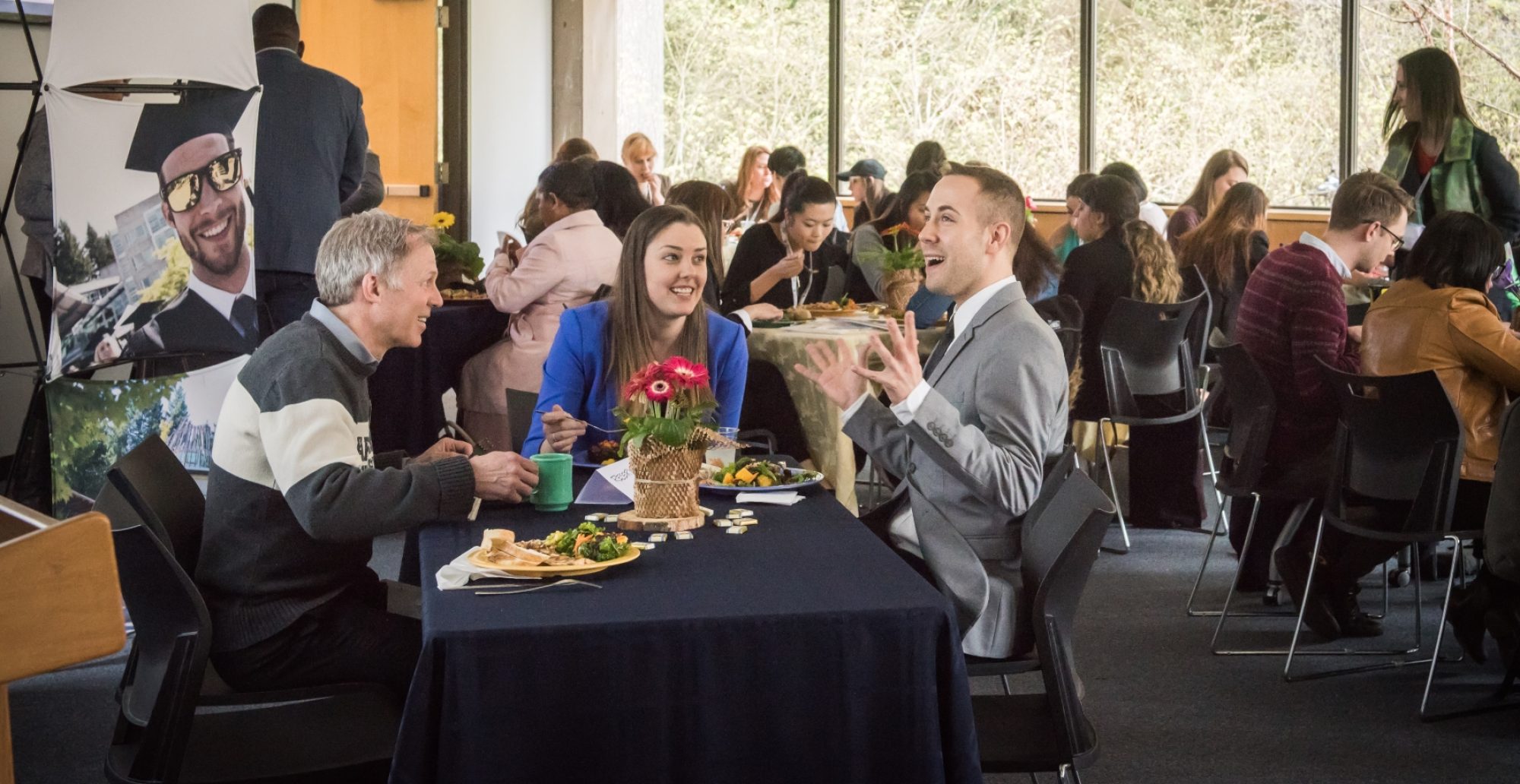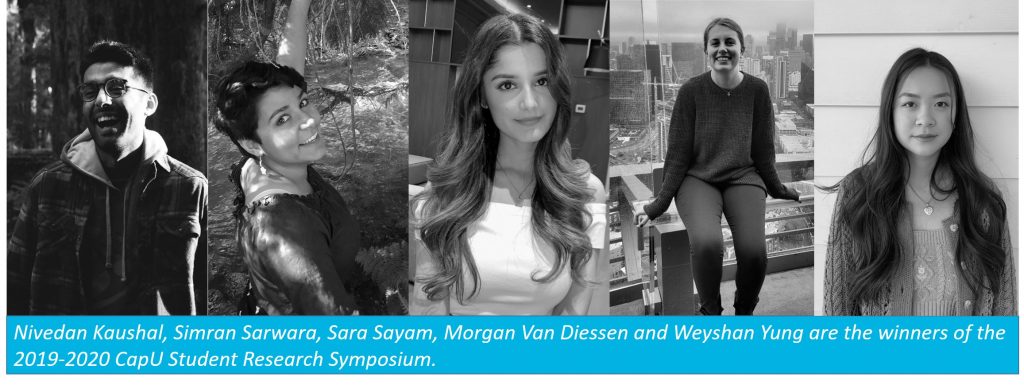2024
Each year one student, from the various cohorts participating in the Student Research Symposium, is eligible to receive excellence in research award.
Each department has an awards committee that is responsible for the adjudication of this award.
We would like to extend our thanks and gratitude to Dawn Whitworth, Associate Vice President, Creative Activity, Research and Scholarship, Laureen Styles, Vice President Academic & Provost for the resources and funding required to host this event.
We would also like to extend our thanks and gratitude to Creative Activity, Research, and Scholarship & Graduate Studies for funding for the SRS award recipients.
The awards ceremony will be held between 9:00AM to 10:00AM during the Opening Ceremonies in Birch lower cafeteria on April 19th.
Congratulations to the following students who received a 2023 Mitacs Research Award for their outstanding Capstone projects:
Bryn Kinders
Using an ACT protocol to reduce symptoms associated with anxiety: A review of the literature Abstract: This presentation will examine the literature and comment on the effectiveness of using Acceptance and Commitment Therapy as a protocol for reducing symptoms associated with anxiety and anxiety disorders. The presentation will compare 12 studies that examine various symptoms, all of which are associated with anxiety or stress related conditions. This presentation also aims to evaluate ACT as an evidence-based practice and will discuss the social validity of this approach and the future implications that expanding the field of Applied Behaviour Analysis to also address covert behaviours might have.
Maria Mulder
Marshall Martin and Shelley Ferguson Being mindful of time: How attention to time mediates meditation’s influence of time perception Abstract: Previous studies that look at meditation’s influence on subjective measures of time perception show mixed results. Some say that meditation leads to a feeling of a slower passage of time, while others say it leads to a faster passage of time. A new model proposed by Sedlmeier and colleagues (2020), known as the augmented Buddhist meditation model (ABMM), aims to explain these discrepancies in part through the factors of level of meditation experience, type of meditation practice, and attention to time during meditation. This study aims to directly test this ABMM model and Sedlmeier and colleagues’ unique self-reported “attention to time” factor. Based on predictions of the ABMM for our sample of beginner-level meditators practicing focused attention style meditation (breath focused), we predict that greater reported attention to time will lead to subjectively longer meditation sessions in retrospect. We hope our findings add to the current theoretical landscape of meditation’s effects on time perception and help clarify what role the ABMM model should have in guiding future research.
Toni Dicastri and Karen Tadokoro Art as Event Abstract: This presentation focuses on Art as Event in an early childhood setting. This shapes art as a highly relational practice that is based on post humanism and new materialist theories. This inquiry draws attention to how very young children’s artistic processes are situated within a network of relations. Children are in a co-collaboration with human and more than human others, and relationships are created through these events. In this network of
relations there are not only other children, but educators, materials, places, spaces, time, histories and other entities. Meanings are composed together with others inside of these events. Each art event is situational and nuanced.
Avery Froese Life Just Isn’t What It Used to Be: An Exploration of the Maternal, the Mirror Stage, and Cinematic Suture Abstract: Have you ever wished to return to days past? Has the popular idiom describing a healthier and more vibrant grass on the opposite side of a dividing fence ever applied to your life? Does the idea of repeating the innocent days of youth sound appealing? It is very common for these questions to be answered with a reminiscent “yes”, and while most adults, if questioned, would likely not wish to return to their childhood bodies and forfeit the rights and freedoms granted by maturity, few will deny the desire to reclaim the innocence and whimsy held within the years of infancy. Indeed, no cognizant experience can compare to the unconscious delight experienced by an unborn child, safely nestled within the womb of their caretaker, with nothing but the muffled sounds and distant experiences of the mother to create a soundtrack to a blissful state that can only be described as being. However, this elation has a very early expiry date, terminating once the newborn has left the womb and experiences themselves in the form of Jacques Lacan’s mirror stage, where their own vision forever alters the onlooker’s perspective of reality. Nevertheless, there is a unity within these opposite occurrences. Although sound plays an integral part in the tranquility of maternal existence, and sight assists in the angst and uncanny sustained by the mirror stage’s outcome of self-realization, the two senses combine, in the form of cinema, and suture the viewer back to a near-tranquil experience, which is as close as we can come to achieving the carefree life we all once lived.
Congratulations to the following students who received a 2022 Mitacs Research Award for their outstanding Capstone projects:
Melanie Solbach The interview-informed synthesized contingency analysis: A Review of the literature Abstract: Behaviour analysts developed a standard functional analysis (FA) to identify the maintaining consequences of problem behaviours. Identifying the reinforcing consequences permits a clinician to implement the most effective, safe, and efficient behaviour treatment. A standard functional analysis (Iwata,
Dorsey, Slifer, Bauman, & Richman, 1982/1994) consists of the direct observation and measurement of problem behaviour and is considered the “gold standard”. During the process of a traditional FA, a clinician systematically isolates and manipulates establishing operations (EOs) across several test conditions to identify the reinforcing contingencies of problem behaviour. The process of a standard FA is often time-consuming, complex, and impractical. Hanley (2014) modified the process of the standard FA to address feasibility, time constraint, and practicality while maintaining the empirical essence of the functional analysis. The modified FA method, called Interview-Informed Synthesized Contingency Analysis (IISCA), exposes problem behaviour to two or more reinforcers in a single test condition. This paper reviews ten recent studies on the ISSCA process and will report on social validity, status as an Evidence-Based Practice (EBP), treatment outcomes, and future clinical and research considerations.
Jane Agyeman Looking for Reflections: Belonging, Trauma, and Joy in Minority Media Representation
Lindsay Cooper The Queer Art of LGBTQ+ Representation in Video Games Abstract: In 2014, we saw feminist scholars fight for better female representation in video gaming, resulting in the vitriolic Gamergate harassment campaign led by right-wing gamers who felt as though their identities and hobbies were being attacked. In more recent years, we have seen the discussion surrounding representation in gaming focus on a new subject of interest – queer identities. Although there is still work to be done, games have begun to introduce more queer themes, characters, and content over the last decade with more respect and nuance than before. Some research has examined queer content in video games, however, there is little research has on how gamers perceive queer content in video games. This paper seeks to analyze the history of queer representation in gaming, how the gaming industry itself deals with it, and how indie game developers have begun to pave the way for better representation in AAA game titles. By conducting a survey of 572 gamers via Reddit and through a netnographic analysis of gaming subreddits and news article discussions, this research seeks to examine how gamers react to – and their opinions on – queer representation in video games.
Saskia Kemper Reconstructing Time and Place in Early Childhood Education Abstract: My purpose of researching time and place in early childhood education was to dismantle the dominant binaries and discourses that surround both time and place. We looked at leading theories that greatly influence the field of early childhood education, such as Piaget’s theory of cognitive development and Rousseau’s romanticized image of the child. We tried to locally position and situate this living inquiry to be relevant and intentional to the lands and time around us. We continuously were confronted with the entanglements of life and how interconnected everything is with each other. Throughout the living inquiry we wove the more-than-human life forms and their agency into question and how our actions and choices are impacting lifeworld’s beyond human understanding.
Emma Lawless Lacanian Desire & The Unconscious VS Today’s Zeitgeist Abstract: This paper explores today’s zeitgeist, which holds the belief that in order to truly be alive, one must chase their desires or dreams. By collecting data from textbooks, academic journals and online articles, I break down philosopher Jacques Lacan’s psychoanalytic theory of desire, the Other and the unconscious; demonstrating resistance to that belief and instead revealing a culture run on capitalism. Lacan’s psychoanalytic theory also supports the paper’s critical analysis of Netflix’s 2021 hit show, Squid Game, and its gritty portrayal of the consequences of materialism and desire – offering what very well may be a cold critique on neoliberalism as well.
Congratulations to the following students who received a 2021 Mitacs Research Award for their outstanding Capstone projects:
Mary Mae Oquendo A Review of the Application of Applied Behavior Analysis to Increase Physical Activity Abstract: Applied Behaviour Analysis (ABA) uses systematic approaches to change socially significant behaviour. This review literature will be examined various ABA strategies to increase physical activity in people. The varying approaches are discussed in terms of ease of application, efficacy, and considerations for further research.
Carson Polly Triqueta: The Pre-Roman Lives of the Celts
Marley Handel Lane Ending the She-cession: The Imperative of Women’s Substantive Equality Post-Covid in Canada Abstract: The pandemic has exacerbated and exposed women’s economic inequality. This study examines how the marginalization of women in Canada prior to the pandemic became all the worse when COVID-19 hit, deepening the segregation of women. To understand the various socio-economic factors at play, the work of Elizabeth Anderson, Catherine MacKinnon, and Elissa Braunstein form a feminist economy theoretical framework for understanding the inequality imposed on women as a result of political, economic, and societal decisions. It will argue that, as an imperative of economic and social policy, women must have substantive economic agency, security and equality. Anchored in a feminist political economy, a review of quantitative and qualitative research by Dawn Desjardins, Katherine Scott, Carrie Freestone, and Statistics Canada will help define what women’s substantive economic equality should look like post-COVID. This study will further discourse within the field which exposes the marginalization of women. It will contribute a new
dimension to understanding income inequality, racial segregation, and systemic discrimination by examining the recent impacts of COVID-19
Dianne Natrall Decolonizing Education: Responding to the TRC Abstract: As early childhood educators, how can we reimagine education of the legacy of colonization in education? Through the curriculum development, the lecture-style instruction is still present. In other words, our current curriculum is based on the economical status of our country. Decolonization is a messy, dynamic, and contradictory process, it involves, for example, talking about racism is a difficult topic for educators and students as well as for anyone unwilling to consider their complicity with this country’s long history of racism. Yet confronting and eliminating the false concept of racial superiority is a necessary initial process in developing a decolonization consciousness in Canadian education. Through the reconceptualist paradigms challenges the singular truth about education, in other words, Western education privilege the value system and institutions. In other words, what does and does not count as knowledge. And through the social constructivist perspectives that are based on how people learn. Children construct or build new knowledge on what they already know. Children actively construct meaning through experiencing things and reflecting on their experiences. This construction of making meaningful experiences is based on Indigenous worldviews and place-based education. Everything is built upon relations to the earth, plants, land animals, sea animals just to name a few relationships. The Western educational system is based on what does and does not count as knowledge. For Indigenous people, we implement a holistic education that looks at the child as a whole person. This approach engages all aspects of the child, spiritual, emotional, physical, and mental, and their interconnectedness with others and the world. Learning is active and reflective and creates meaning in the context of the children’s lives. Research has already begun to decolonizing education through Truth and Reconciliation and Human Rights.
Congratulations to the following students who received a 2020 Mitacs Research Award for their outstanding Capstone projects:
Nivedan Kaushal
Orientation and Gestalt Formation: How We Make Sense of the Music We Hear
Abstract: In this paper, I show that our ability to understand a piece of music as a gestalt, a cohesive cognitive unit separate yet emerging from the summation of its constituent parts, is shaped at large by enculturated patterns of music cognition and expression. I do this by examining West African and Western music-culture’s respective dispositions towards orality or literacy which are evident in their pedagogies. Juxtaposing these pedagogies makes clear the kinds of oral and literate means of transmission and thinking by which individuals of these music-cultures form orientations, the point from which one “feels” a music structure’s rhythmic and phrasal attributes, and, ultimately, gestalts. When individuals encounter a different mode of cognition and expression, one that has not been culturally prescribed to them, gestalt formation can become impeded due to an incongruity of orientation between music structures resulting in their inadequate integration. I use my own experiences as examples to explain my claims.
Simran Sarwara
Disrupting the Talent Pipeline: Youth Engagement & The Nonprofit-Industrial Complex
Abstract: The focus of this project is the development of youth engagement curriculum that can be accessed and applied by local communities that conduct this work. This curriculum is rooted in the context of unpacking the concept of youth engagement as it has come to be used in the work of non-profit sectors, grassroots organizing, community organizations and group, and elsewhere. The project develops curriculum that will be available as a resource to those same groups. It builds off of the experience of the author as a young woman of color navigating the youth engagement sphere locally as well as building off of insights and critical analyses as shared by others with similar or different lived experiences.
Sara Sayam
Technology-Based Strategies to Teach Communication Skills to Individuals with Intellectual and/or Developmental Disabilities: A Review of the Literature
Abstract: Handheld electronic devices in the form of speech generating devices (SGD), have become increasingly prevalent in today’s society for individuals with intellectual and/or developmental disabilities (I/DD). These tools have been demonstrated to be effective through various research studies, promoting its development of attaining its status as an evidence based practice. This literature review encompasses ten research studies evaluating the effects of handheld mobile technological devices (e.g., iPad, iPad Mini, iPod), as SGDs by means of fostering functional communication skills such as madding, responding, commenting and discriminating between stimuli in individuals with I/DD. The research question imposed for this literature review involves the effectiveness of technological devices as a form of teaching communication skills to individuals with I/DD who have little to no speech abilities. Through the findings in this review, the results suggest an overall increase in communication through various forms for all participants involved. This suggests continued support for the use of handheld computing devices as SGDs for individuals with I/DD. Future directions in research can include advancements in teaching of more complex forms of communication such as requesting using full sentences, independently asking questions, in addition to inclusion of social factors for communication such as eye contact, smiling, and body posture.
Morgan Van Diessen and Weyshan Yung
Living Well in the Presence of Boundaries Abstract: an inquiry with the children, families, and educators of Skyfire. Together, Weyshan Yung and Morgan van Diessen wondered how the community of Skyfire could begin to resituate themselves amongst the more-than-human neighbours and reconsider what it means to live well within a space whilst relying on a common worlds framework. To start this process, the group focused on the tension-filled relationships many had with the resident raccoon family. Through this attention to raccoons, the group began to make visible many concepts and others that previously escaped their view, most notably: boundaries. With many explorations with the children, boundaries became a new lens through which to see the world. Unexpectedly, this lens not only highlighted the separations, but also the points of contact and connection. Weyshan and Morgan hope that this inquiry can inspire other early childhood communities to critically review and reconsider their ideas surrounding place and belonging. Just as their inquiry highlighted, the journey is anything but a straight path and the destination remains out of view, but the possibilities for richness found in broadening your community, connections, and range of visibility are endless.
Mitacs is a national, not-for-profit organization that has designed and delivered research and training programs in Canada for 20 years. For more information, visit https://www.mitacs.ca/en/about


